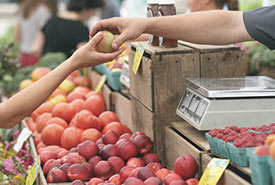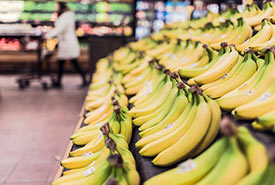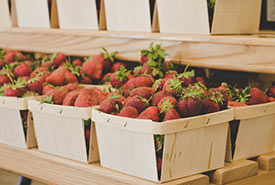Shopping local: A berry beneficial choice

Farmers' market (Photo by Erik Scheel, Pexels)
‘Tis the season
You wake up on a lazy Saturday morning. The sun is shining, the grass is green and fresh produce is in season. It's time to make your way over to your nearest farmers' market to stock up on locally made and grown goods.
Farmers’ markets are lively events during the warmer months, in cities and towns across Canada. Shopping at farmers’ markets is not only fun, it can also have a positive impact on the environment, your health and your community.
Environmental impact

Much of the food from a supermarket travels long distances before reaching the shelves (Photo by Gratisography, CC0)
Shopping for local products can be a more environmentally friendly choice than heading to the supermarket. Much of our food is grown far away from Canada, in places like California, Guatemala and Mexico. According to Peace and Development Canada, it’s estimated that, on average, one meal travels a distance of 3,000 kilometres to reach the plates of Canadian consumers.
The further the food has to travel, the longer and more energy intensive the process becomes. From picking and sorting, to shipping and storing, these steps all require large amounts of energy in the form of electricity and oil. Products sold at farmers’ markets are generally created or grown within a 160-kilometre radius of the places they’re sold, which can greatly help reduce the product’s total carbon footprint.
The use of fertilizers such as phosphorus are also commonplace on larger industrial farms. They are added to the soil to try and increase the quality and growing time of plants. Run-off from these products can accumulate in bodies of water, causing toxic algae blooms, a process called eutrophication. This unsustainable practice depletes the soil of its nutrients, rendering it unusable. Most small-scale farmers use these fertilizers more sparingly or don’t use them at all, which helps preserve the soil’s integrity for the next growing season.
Local products often tend to come with much less packaging. Products sold locally aren’t typically wrapped. This gives consumers a chance to bring their own reusable bags and reduce the amount of plastic and other garbage that ends up in landfills and waterways.
Healthy choices
Another bonus that comes from shopping locally is that the products purchased are generally better for your health. Products found on the shelves of grocery stores are usually picked days or weeks before, and they have sat ripening in fridges or on shelves before they hit the store. More traditional practices allow produce to ripen in the field, and they are picked right before being sold. When picked at its prime, produce tastes fresh and is packed with maximum nutrients.

Fresh strawberries at a farmers' market (Photo by Alexandria Baldridge, Pexels)
Buying local also means buying what’s in season. In the summer months, you’ll see strawberries and raspberries starting to appear, while products like squash and pumpkins only appear in the fall. This is the way we traditionally ate before technology made it possible to store our food in fridges and ship food from warmer climates in the dead of winter.
The best part about farmers’ markets is that if you have any questions about how products have been produced or made, you can just ask the farmer! It’s a rarity these days to be able to meet the people who grow our food and to have the answers to our questions right in front of us.
Community involvement
Finally, shopping for locally sourced products helps you become an active member in your community. Much of the food we eat is produced on large-scale single-crop farms. According to Statistics Canada, between 1931 and 2006, the total land being farmed increased, but the number of farms in operation decreased almost 70 per cent from over 700,000 farms to 229,373, as smaller farms were taken over or bought out by larger industrial farms. By purchasing local products, you are supporting farm families and keeping your money within your local economy.
Unique events such as farmers' markets create vibrant communities where people come to meet up and connect with their friends, family and neighbours.
Have fun, eat fresh!
These are just some of the many benefits of shopping locally. Next time you’re looking for a relaxed weekend activity or a colourful vegetable to brighten your summer salad, be sure to look for a farmers’ market near you. Feel good, have fun and make a difference!
The Conservation Internship Program is funded in part by the Government of Canada’s Summer Work Experience program.


